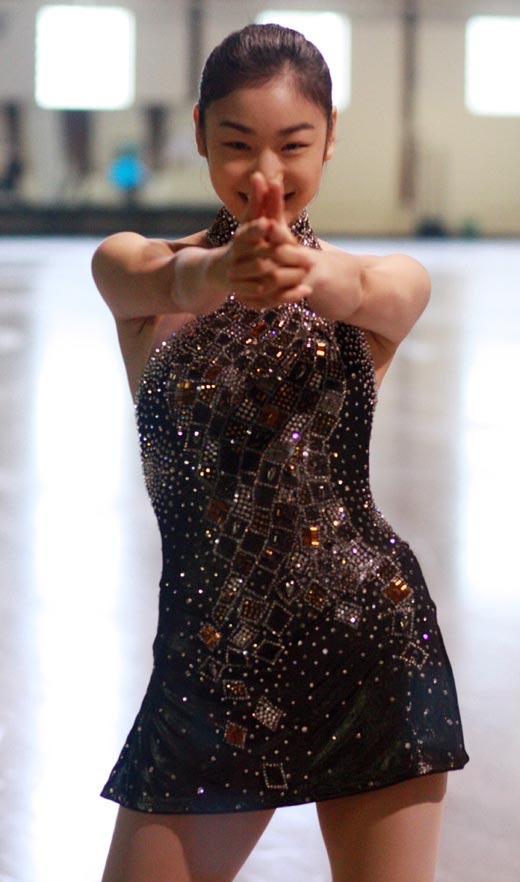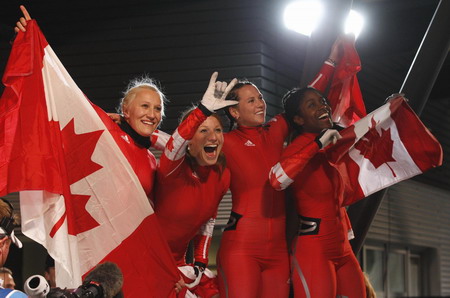China wins women's 3,000-meter relay after DQ
By BETH HARRIS AP Sports Writer
Thursday, February 25, 2010
VANCOUVER, British Columbia - A disqualification, a bloodied skater and the American team wins a medal after nearly getting lapped.
Just another night at short-track speedskating.
South Korea crossed the finish line first in the women's 3,000-meter relay Wednesday and was preparing to celebrate when the judges decided otherwise.
The four-time defending Olympic champions were disqualified for impeding, having clicked skates with China just after an exchange with five laps to go.
That gave China its first gold medal in the relay, prompting Wang Meng, Zhou Yang, Sun Linlin and Zhang Hui to jump into the rinkside padding for celebratory hugs with their coaches.
In the excitement, Zhang got cut, causing blood to stream down her face.
The Americans fell out of contention early in the 27-lap race, nearly getting lapped toward the end. But the DQ moved everyone else up, with Canada earning the silver and the United States the bronze.
"That's short track. Anything can happen at any moment," American Lana Gehring said. "You don't know the end result until it's final."
Several minutes went by as the referees conferred while South Koreans Cho Ha-ri, Kim Min-jung, Lee Eun-byul and Park Seung-hi had their country's flags in hand and were ready to celebrate.
Within minutes, though, it all changed. The DQ was announced and they slowly lowered their flags to the ice. Cho put her head down and covered her eyes with her left arm.
"I don't have any clue what the referee was saying," Kim said. "It doesn't make any sense at all."
South Korea's coach Choi Kwang-bok (C) appeals to a race official (L) after his team's disqualification in the women's 3000 metres relay short track speed skating final at the Vancouver 2010 Winter Olympics February 24, 2010
China's gold medallists (R) celebrate with coaching staff as South Korea's coach Choi Kwang-bok (L) reacts to his team's disqualification after the women's 3000 metres relay short track speed skating final at the Vancouver 2010 Winter Olympics February 24, 2010.
A victory would have allowed South Korea to break a tie with Germany for most consecutive wins in a specific women's event at the Winter Games. South Korea had won the 3,000 relay in every Olympics since 1994. Germany won the 5,000-meter long-track speedskating and the luge singles in four consecutive Olympics.
"Blade contact is no reason for a DQ," said South Korea women's coach Choi Kwang-bok, who pounded angrily on the pads when informed of the DQ. "I don't understand why they did that."
Choi pointed out that women's referee Jim Hewish of Australia was the same official who disqualified South Korea's Kim Dong-sung to give Ohno his first career gold medal at the 2002 Salt Lake City Games. Afterward, the U.S. Olympic Web site received so many angry e-mails, many from South Korean fans, it crashed.
Asked if he thought Hewish had a grudge against the South Koreans, Choi answered sharply, "No comment."
South Korea's Kim was in the lead when her left skate blade clicked with the right blade of China's Sun. From there, South Korea's Park pulled away to a big lead before teammate Cho finished off what they thought was a record fifth gold medal.
"She tried to make a pass and there was an impediment collision," Sun said. "We respect the decision of the judges."
The gold went to the Chinese, who smiled and waved, each one holding a corner of their country's flag. Zhang appeared on the podium with a bandage and later needed stitches to close the cut on her chin.
"We are not exactly clear on what happened," Wang said. "In short track, there is a lot of physical contact. The Korean skater (Kim) was trying to make a pass when the contact happened. Regardless of the referee's decision, whether it was for or against us, we would have accepted it."
The Americans were thrilled to receive the bronze, the first medal won at these games by the women's short track team.

























































































